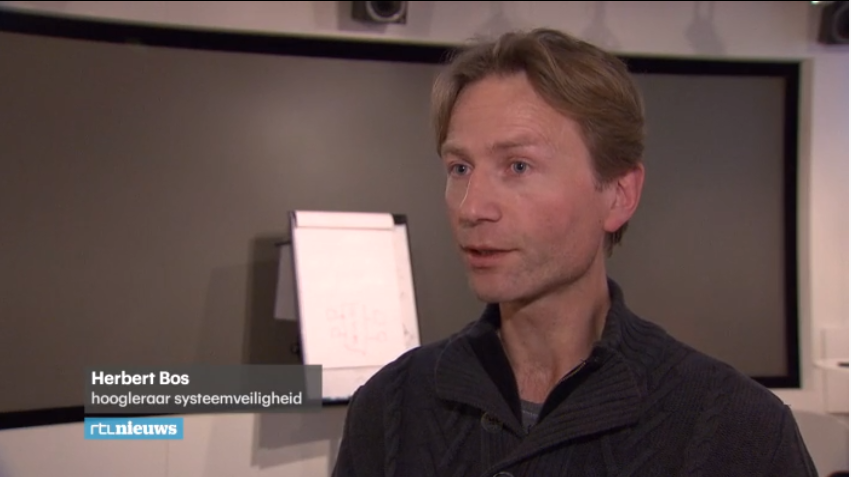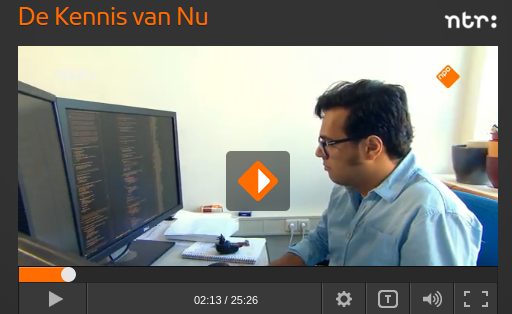RTL Nieuws (TV, Dutch) reported on the vulnerabilities in computers used in Dutch elections. Asked for a reaction, Herbert agrees this looks bad. A few days later, the government decided to stop using the vulnerable systems. On Feb. 1st, the New York Times also reported on this.
Category Archives: press
Lecture about hacking (Dutch)
Last month, Victor and Herbert gave a lecture about buffer overflows and return-oriented programming on Dutch national TV.
Drammer in the news
Drammer was presented at CCS 2016 3 weeks ago. Our work shows that the Rowhammer hardware vulnerability is prevalent on mobile devices and that attackers can exploit it in a deterministic manner (a la Flip Feng Shui).
Press, Vendor Coverage & Discussion
After initial coverage in the form of two written articles by Ars Technica and WIRED, and a podcast from Security Now!, Drammer was quickly picked up by the mainstream press. International items include: Daily Mail, PCWorld, Softpedia, Slashdot, Tech Times, The Register, Fossbytes, The Inquirer, Digital Journal, Hack Read, SC Magazine, Threatpost, BetaNews, Gamenguide, TechTarget, BleepingComputer, NDTV, On the Wire, and InvestorPlace.
Other local items popped up in Argentina (Segu-info), Austria (Der Standard), Belgium (DeMorgen), China (Freebuff, Sohu, EEPW), Czech Republic (Svět Androida), Denmark (Version2), France (Silicon, Le Monde Informatique, Informanews), Germany (Der Spiegel, Golem.de, Pro-Linux, Crn.de, JAXenter, Computer Bild , t3n Magazine, Netzwelt.de), Hungary (HWSW), Italy (Repubblica.it, Punto Informatico, Gadgetblog.it, Tutto Android), Mexico (PCWorld Mexico), The Netherlands (NU.nl, Tweakers.net, Crimesite), Norway (Digi.no), Poland (eGospodarka, Softonet, PCLab.pl, Dobreprogramy, PC Format, Telix.pl), Russia (Хакер, Securitylab.ru), Slovakia (Živé.sk), Spain (López Dóriga, CSO, El Android libre), Switzerland (Neue Zürcher Zeitung), Taiwan (iThome), Turkey (Teknokulis, CHIP, Webtekno), and Ukraine (KO).
Bruce Schneier linked to our project page and we made it to the front page of The Hacker News. Shortly after, Drammer prompted Rowhammer mitigation efforts on LWN and was discussed by Linus Torvalds on Alan Cox’ Google Plus post. We caused a spike in Google queries for Rowhammer, approaching its popularity from 2015, when Google’s Project Zero released the Rowhammer-based exploit.
The Drammer paper (pdf) was accessed over 25k times, while our github repository received 913 unique views and 83 unique clones.
Drammer made an appearance on Dutch national television in an episode of De Universiteit van Nederland (“The University of The Netherlands”).
Flip Feng Shui in the news
Flip Feng Shui was presented at USENIX Security 2016 2 weeks ago. This novel attack technique combines a hardware vulnerability with a physical memory massaging primitive to mount a reliable attacks anywhere in the software stack. In particular, we demonstrate practical cross-VM attacks on OpenSSH and GnuPG using Rowhammer and KSM.
Impact
Given its practical impact, the Dutch National Cybersecurity Centre took the lead in disclosing Flip Feng Shui. They initiated disclosure to their counterparts in several other countries, as well as to application vendors, OS vendors, hypervisor vendors, and cloud providers. Prior to our talk at USENIX Security, the details of this technique were kept private.
Press & Vendor Coverage
The press has also picked up on this and there is quite some coverage. Arstechnica has a thorough piece on this work. Steve Gibson described Flip Feng Shui as “the most incredibly righteous and sublime hack… ever” in one of the Security Now! podcasts. WIRED also has the right idea: Forget Software—Now Hackers Are Exploiting Physics. Bruce Schneier posted a news item on his blog and there are podcasts by Risky Business (http://risky.biz/RB422 @ 31:40). Other international news items include: The Register, Infoworld, Slashdot, The Stack, Softpedia, Science Daily, and CORDIS.
Other local items popped up in China (Tech.qq.com, Sohu), Finland (Viestintävirasto), France (Silicon), Germany (Deutschlandfunk), Italy (Repubblica.it, HostingTalk), The Netherlands (Security.nl, Computable, Tweakers.net), Poland (Sekurak), Russia (Securitylab.ru), Spain (WWWhat’s new), Ukraine (KO).
The NCSC published a press release with fact sheet and FAQ. Prominent cloud providers posted news items, some of which disabled memory deduplication as a result.
The Dutch TV show “De Kennis van Nu” (roughly: “The knowledge of today”) had an item on Flip Feng Shui and Rowhammer, with Ben and Kaveh acting all hacker-like. (Dutch only)
Dedup Est Machina in the news
Our Dedup+Rowhammer research made it to various international publications, including The Register, SearchSecurity (with mistakes), Softpedia, TechTarget, Risky Business (http://risky.biz/RB414 @ 13:37), and others.
It also featured on national Dutch radio in BNR Digitaal (from 9:10 onward), De Volkskrant, Tweakers, and a security advisory by NCSC (all Dutch).
The slides from Erik Bosman’s S&P 2016 talk are here.
VUSec on Business News Radio
Herbert participated in a panel discussion on Cyber Security on BNR (Business News Radio).
BAndroid Vulnerability Coverage
Our work on the BAndroid Vulnerability appeared in The Register: Academics claim Google Android two-factor authentication is breakable. This was slashdotted twice: here and here.
VUSec quoted in NRC, Dutch Newspaper
Quotes in NRC.nl Betalen met je vingerafdruk: drie vragen over biometrisch bankieren (Dutch).
SROP Coverage on LWN
Jonathan Corbet wrote about our work on SROP on LWN: Sigreturn-oriented programming and its mitigation. Also, someone is working on a new patch.
Botnet Infiltration Coverage in De Correspondent (Dutch)
Interview met Dennis Andriesse in de Correspondent (Dutch), Hoe een opmerkelijke coalitie een Russische crimineel bestreed, door Dimitri Tokmetzis.


